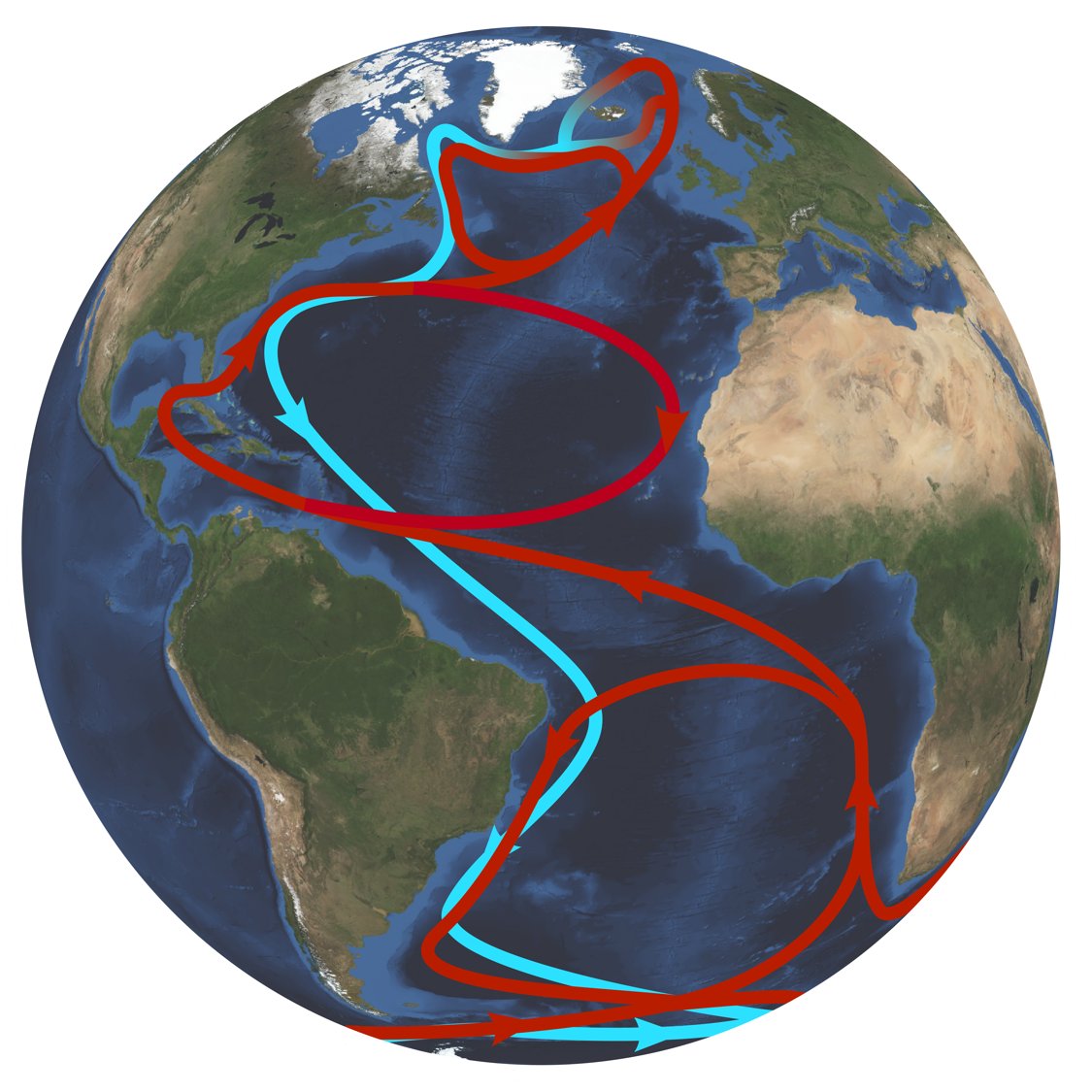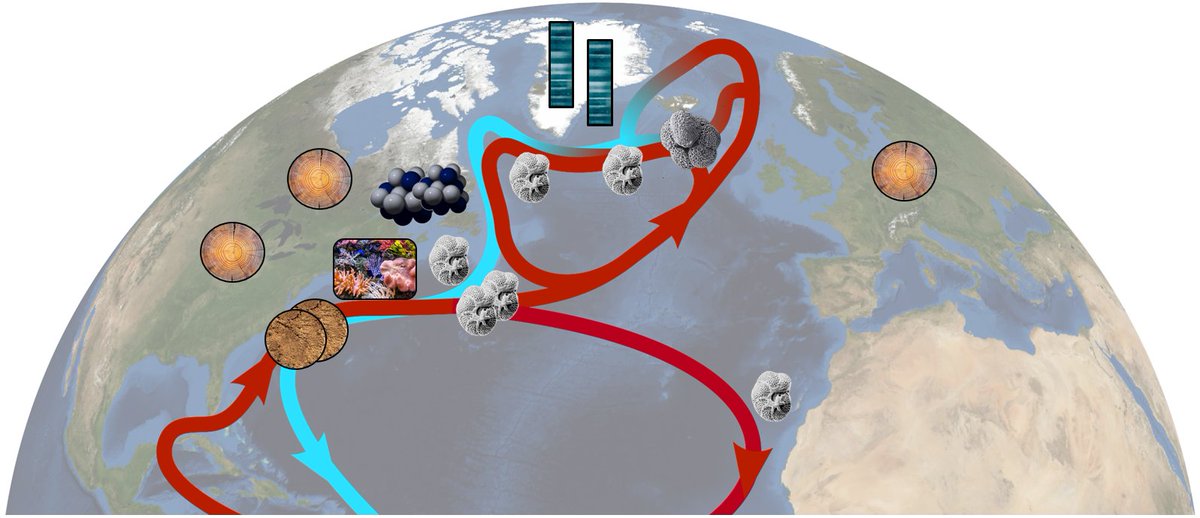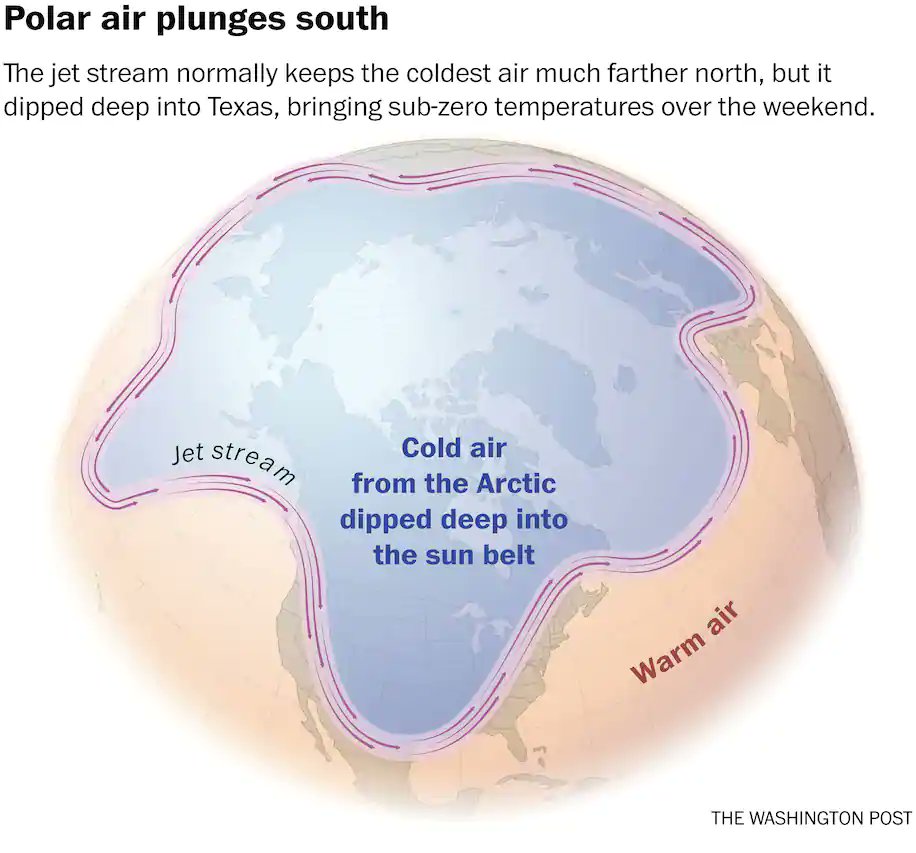
Frisch erschienen: Unser neues Paper in Nature Geoscience erhärtet die Belege für eine einzigartige Abschwächung des Golfstromsystem (Atlantische Umwälzströmung, 𝗔𝗠𝗢𝗖) ! @NatureGeosci
Thread. 1/12
Thread. 1/12

Erstautorin Levke Caesar (Maynooth University) hat eine Reihe von veröffentlichten AMOC Rekonstruktionen aus Proxydaten (v.a. aus Tiefseesedimenten) zusammengestellt, die bis 1600 Jahre zurück reichen. Sie zeigen Strömungsgeschwindigkeit, Wassermassen, Wärmetransport an. 2/12 

Diese Daten zeigen übereinstimmend eine klare Abschwächung im 20. Jh; in den letzten Jahrzehnten ist die Strömung am schwächsten. In 9 der 11 Datenreihen ist dies statistisch signifikant. 3/12 

Diese Abschwächung wurde so von Klimamodellen als Folge der #Erderhitzung vorhergesagt und verursacht einen spezifischen Fingerabdruck der Meerestemperaturen, incl. "Kälteblase" im nördlichen Atlantik. Siehe scilogs.spektrum.de/klimalounge/st… 4/12 

Was die beiden letzten Berichte des Weltklimarats IPCC zur Abschwächung gesagt haben. Der IPCC ist bekannt konservativ, bin gespannt was der nächste Bericht zu den neuen Belegen sagen wird. 5/12 

In diesem Spiegel-Kommentar habe ich im September zwei weitere Studien mit Belegen für eine Abschwächung besprochen. spiegel.de/wissenschaft/m… 6/12
Einige erwähnen zur aktuellen Studie eine weitere, die einen stabilen Golfstrom seit 1990 fand. Das deckt sich mit unserer Rekonstruktion: dem Langzeittrend überlagern sich Schwankungen, 1990 war danach ein Tiefpunkt. Ab 1990 gerechnet sehen wir daher auch keinen Trend. 7/12
Dieses und weitere mögliche Gegenargumente gegen eine anthropogene Abschwächung habe ich hier bereits 2018 diskutiert: realclimate.org/index.php/arch…
Grafik: Darstellung der Kälteblase im Atlantik (Trend der Lufttemperaturen) aus dem 5. IPCC-Bericht. 8/12
Grafik: Darstellung der Kälteblase im Atlantik (Trend der Lufttemperaturen) aus dem 5. IPCC-Bericht. 8/12

Wie viel Abschwächung der AMOC sagen die neuesten Klimamodelle (CMIP6) bis 2100 voraus? Zitat: "the AMOC might decline between 6 and 8 Sv (34–45%) by 2100." Das könnte uns gefährlich nahe an den Kipppunkt bringen. agupubs.onlinelibrary.wiley.com/doi/full/10.10… 9/12
Mehr zum Risiko, den Kipppunkt zu überschreiten, habe ich hier geschrieben: scilogs.spektrum.de/klimalounge/di… 10/12
Einige Medien zu unserer Studie:
Washington Post washingtonpost.com/climate-enviro…
Guardian: theguardian.com/environment/20…
Financial Times: ft.com/content/589d03…
Spiegel: spiegel.de/wissenschaft/n…
Tagesspiegel: tagesspiegel.de/wissen/wahrsch…
SZ: sueddeutsche.de/wissen/klima-k… 11/12
Washington Post washingtonpost.com/climate-enviro…
Guardian: theguardian.com/environment/20…
Financial Times: ft.com/content/589d03…
Spiegel: spiegel.de/wissenschaft/n…
Tagesspiegel: tagesspiegel.de/wissen/wahrsch…
SZ: sueddeutsche.de/wissen/klima-k… 11/12
Zu guter Letzt: ein kurzer Ausschnitt aus dem Hollywoodfilm The Day After Tomorrow von 2004. Den hatte ich damals hier besprochen: pik-potsdam.de/~stefan/tdat_r… 12/12
• • •
Missing some Tweet in this thread? You can try to
force a refresh









